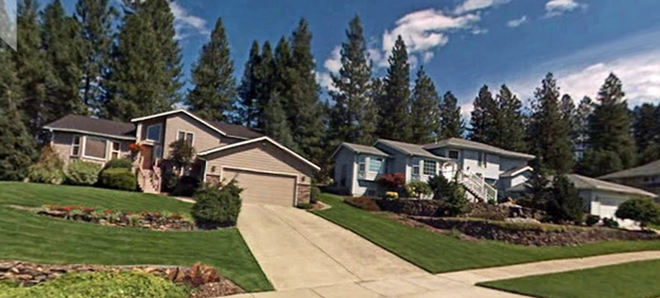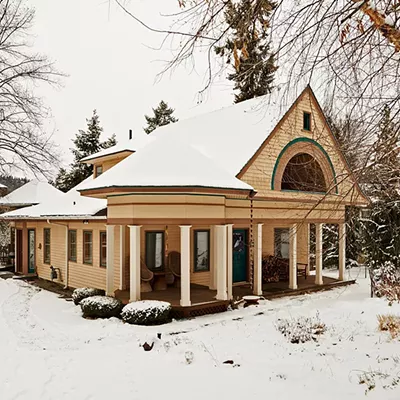Wednesday, March 12, 2014
We beg people to take risks, then we slap them with cease-and-desist orders

Last week I sat in a workshop for entrepreneurs hosted by GSI at the McKinstry Innovation Center, and listened to people with decades more experience than I offer their opinions on what Spokane needs in order to make it a thriving, creative, economically vibrant place.
The group was diverse for Spokane, with a good mix of young and old and even a city councilperson in attendance. Opinions varied, but throughout, I heard a clear and common chord struck: To make Spokane competitive, we need to encourage people to take risks!
We need more risk takers! Frontiersman of our age! Pushing the envelope!
And then this week, we learned that our code enforcers had cracked down on scofflaws who had been renting rooms to people via the hipster rental black market known as Airbnb without paying the hotel/motel tax. Some had committed the heinous crime of running a bed & breakfast in a non-historic structure. Code enforcement took care of it, though, issuing “at least a dozen” cease-and-desist orders.
I can’t help but feel like those two moments are connected.
We beg people to venture boldly, then stop them in their tracks for not poring through a moribund and bizarre city code before offering their grown son’s bedroom to strangers for $65 a night. That’s a conflicting mindset, and it stifles innovation.
There isn’t room to discuss all the absurdities of a lodging code that says you can run a B&B out a janky turn-of-the-century victorian in Peaceful Valley but not a totally pristine turn-of-the-millenium faux-craftsman in Southgate, so I’ll stick to the central point:
If we want people to start new things — and make money and increase the tax base and, yes, push the envelope! — we should help them through the more labyrinthine civic procedures, not wait to punish them for minor mistakes.
We need mentors, not enforcers.
Now let me be clear: I realize that renting your home on Airbnb isn’t the same as inventing Airbnb, but entrepreneurship is entrepreneurship, and risk is risk.
And innovation is happening here. People have bought homes in Spokane specifically to use as Airbnb properties. Now obviously we want to be careful about how many high turnover, lodging-style businesses we let into our neighborhoods, but an archaic historic bed-and-breakfast law seems like an awful way to regulate that.
What if someone wanted to list their one-bedroom condo in a newer building near downtown? What if someone bought a newer home in suburbia not realizing it they’ll need to wait 20 years to get on the historic registry?
That second question is hypothetical, but the first is not. As of last week there was an active listing on the site for a nice-looking, newer one bedroom in downtown Spokane. Exactly the area of town we want people visiting. But under current laws, it would probably be ineligible because the building isn’t 100 years old and brick.
All the hew and cry has been around how this new competition might hinder current hoteliers and small B&Bs. What about the positive effects it might have on our sluggish real estate market? This weird site is encouraging people to become landlords and take some inventory off the market. That’s a good thing.
Starting new things is really hard, no matter what you’re starting. And even after you’ve been doing something for a while, it’s really easy, even for diligent, honest people to inadvertently break the rules.
Last September, for example, a permitting process we didn’t know about almost shut down Terrain 6.
A month before the event, the Spokane fire marshals called us, in shocked disbelief at the number of people we have in the space every year.
We expressed disbelief at their disbelief. It didn’t make any sense. We had been doing this for over five years. We have a great relationship with the City and the Liquor Control Board. We thought that, if we needed to talk to anyone else — the fire marshals, for example — someone would have told us, right?
It was a stupid assumption, but an honest one.
So let’s be clear: if the fire department had treated Terrain the way code enforcement is treating Spokane’s Airbnb-ers, Terrain 6 wouldn’t have happened. The marshals were well within the law to shut us down completely. Instead, they talked to us and talked to other stakeholders and decided to take the time to help us navigate the code requirements, rather than impaling us on them.
Even with their help, it was one of the most stressful months of our lives, and took a ton of work, but at the end of it we had our most successful night yet.
There’s a lesson in that.
We clearly need to look at the lodging code. Whatever era we were in when it seemed like a good idea to require boutique accommodations be on the historic registry is an era we no longer live in. Amending code, though, is a passive fix.
If we want innovative ideas to take root, we need to actively nurture them.
If our elected officials and business leaders want people — and especially young people — to be bold in their risk taking, it’s not enough to say, “Risk boldly!” They’re going to also need to say, “... and we’ll help.” ♦
Luke Baumgarten, a creative strategist at Seven2 and former culture editor of the Inlander, is a co-founder of Terrain and the founder of Fellow Coworking. He tweets @lukebaumgarten.
Tags: Airbnb , Terrain , Comment , commentators , Image
















